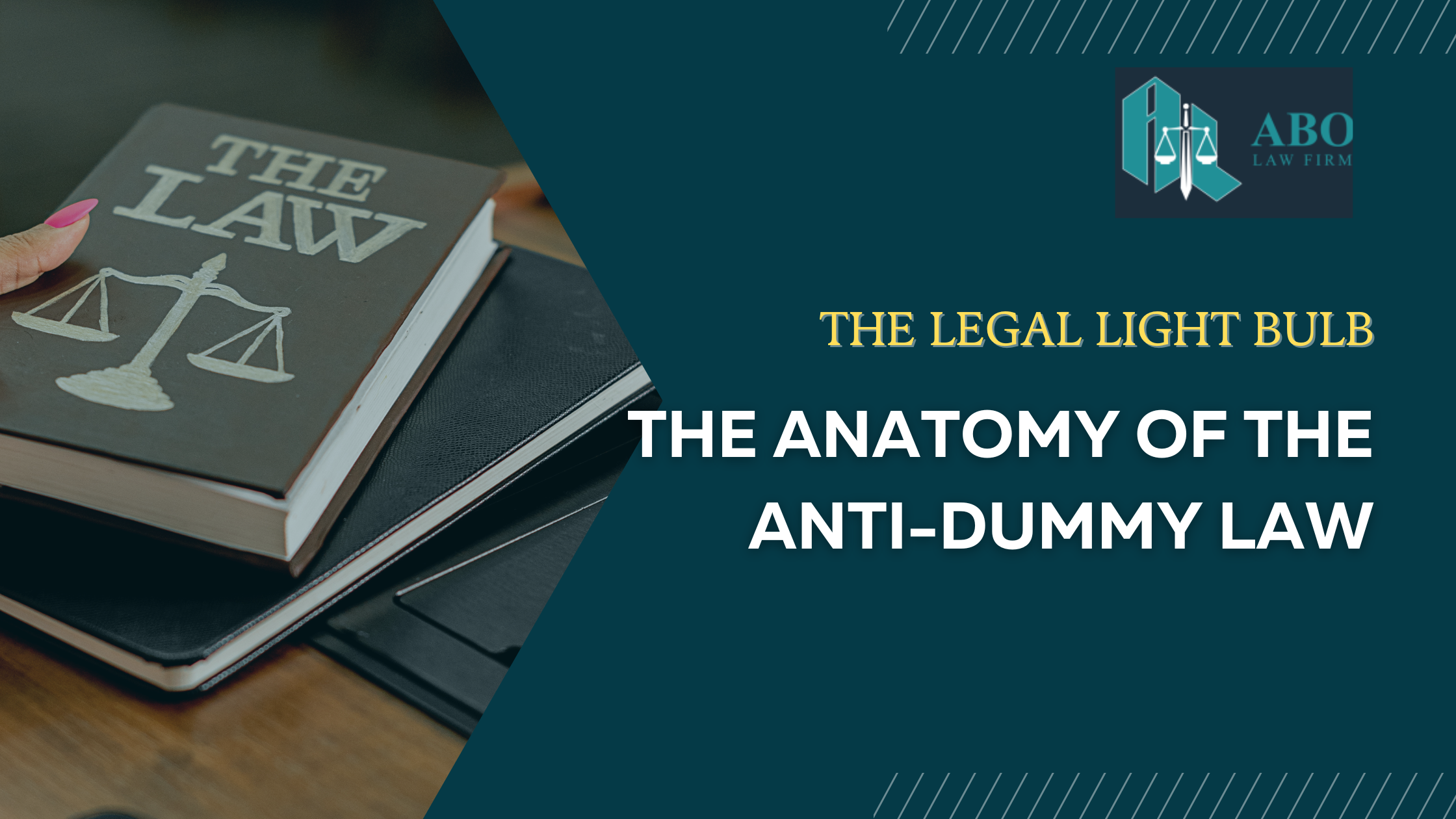The Anti-Dummy Law
Designed to prevent circumvention of constitutional and statutory restrictions on foreign equity, the Anti-Dummy Law prohibits the use of Filipino citizens or entities as “dummies” to hold assets to operate businesses on behalf of foreign nationals. This commonly arises in sectors where foreign ownership is limited or banned outright, including natural resources, public utilities, mass media, and advertising.
Violators face criminal penalties, including imprisonment and fines. More than a deterrent, the Anti-Dummy Law is a signal to foreign investors that compliance with ownership rules is not optional, and backdoor arrangements come at a high legal risk. For those doing business in the Philippines, understanding the Anti-Dummy Law is essential, not just to avoid liability, but to engage in lawful, transparent investment.
Prohibited Acts
The core prohibition of the Anti-Dummy Law lies in its prohibition against the use of Filipino citizens, or nationals of any other country for the purpose of evading constitutional or statutory limitations that reserve certain rights, privileges, or franchises exclusively to Filipino citizens. A prominent application of this restriction is found in limitations imposed on foreign equity participation across various sectors of the economy.[1]
The Anti-Dummy Law further prohibits the transfer, assignment, or conveyance of rights, franchises, and privileges to individuals, whether natural or juridical, or to associations that do not possess the legal qualifications under Philippine law. Equally prohibited is the involvement or participation of disqualified persons in the management, operation, administration, or control of enterprises or activities reserved by law for Filipino citizens or qualified entities. In essence, the law forbids any arrangement that permits an unqualified person to directly or indirectly exploit, benefit from, or exercise enjoyment over rights, privileges, franchises, property, or businesses that are constitutionally or statutorily reserved to qualified persons or entities.[2]
Moreover, the law expressly forbids the simulation of compliance with minimum capital requirements as a means to circumvent statutory mandates on ownership thresholds reserved to Filipino citizens. Such deceptive practices are particularly relevant in the context of industries enumerated under the Twelfth Foreign Investment Negative List, where foreign participation is either limited or entirely prohibited. [3]
The Twelfth Foreign Investment Negative List
The Foreign Investments Act[4] serves as a critical instrument in defining the parameters within which foreign capital may participate in the national economy. Central to this statute is the concept of the Foreign Investment Negative List, a government-issued enumeration of economic activities wherein the extent of foreign equity is either restricted or entirely prohibited.[5]
Specifically, the Negative List classifies certain sectors as partially or wholly reserved for Filipino citizens or corporations, with the intention of preserving national sovereignty, protecting local industries, and ensuring strategic control over vital resources.
The Twelfth Regular Foreign Investment Negative List codifies these limitations. It imposes an absolute prohibition on foreign equity in enterprises engaged in mass media, thereby reinforcing constitutional mandates on the Filipino ownership and management of entities that influence public opinion. Notably, however, this prohibition does not extend to internet-based businesses, which are categorically excluded from the definition of mass media for purposes of foreign ownership restrictions. Other areas where foreign equity is entirely disallowed include the practice of licensed professions, small-scale mining operations, the utilization of marine wealth in archipelagic waters, territorial seas, and inland bodies of water such as exclusive lakes, bays, and lagoons, as well as the operation and management of cockpits.
In sectors where limited foreign participation is permitted, specific equity caps are imposed. For instance, foreign ownership in private recruitment agencies engaged in the deployment of local and overseas workers is limited to 25%. In the field of advertising, a maximum of 30% foreign equity is allowed. A more liberal threshold of up to 40% foreign equity is sanctioned in select industries deemed critical to national development yet still subject to regulation. These include the exploration, development, and utilization of natural resources; the operation of public utilities; ownership of condominium units; private radio communications networks; and educational institutions not established by religious organizations or mission boards.
The Grandfather Rule and the Control Test
Jurisprudence has established two principal tests for determining the nationality of corporations: the Grandfather Rule and the Control Test. Among these, the Control Test is regarded as the primary standard for ascertaining corporate nationality. This doctrinal preference is underscored in Narra Nickel Mining and Development Corporation v. Redmont Consolidated Mines Corp.,[6] wherein the Supreme Court elucidated the application of the Control Test in conjunction with the Grandfather Rule, to wit:
“On the other hand, a corporation that complies with the 60-40 Filipino to foreign equity requirement can be considered a Filipino corporation if there is no doubt as to who has the “beneficial ownership” and “control” of the corporation. In that instance, there is no need for a dissection or further inquiry on the ownership of the corporate shareholders in both the investing and investee corporation or the application of the Grandfather Rule.”[7]
In the same case, the Court provided a definitive exposition of the Grandfather Rule and its nature, purpose, and the manner in which it supplements the Control Test. To wit:
“The Grandfather Rule is “the method by which the percentage of Filipino equity in a corporation engaged in nationalized and/or partly nationalized areas of activities, provided for under the Constitution and other nationalization laws, is computed, in cases where corporate shareholders are present, by attributing the nationality of the second or even subsequent tier of ownership to determine the nationality of the corporate shareholder.”
xxx
The Grandfather Rule, standing alone, should not be used to determine the Filipino ownership and control in a corporation, as it could result in an otherwise foreign corporation rendered qualified to perform nationalized or partly nationalized activities. Hence, it is only when the Control Test is first complied with that the Grandfather Rule may be applied. Put in another manner, if the subject corporation’s Filipino equity falls below the threshold 60%, the corporation is immediately considered foreign-owned, in which case, the need to resort to the Grandfather Rule disappears.
On the other hand, a corporation that complies with the 60-40 Filipino to foreign equity requirement can be considered a Filipino corporation if there is no doubt as to who has the “beneficial ownership” and “control” of the corporation. In that instance, there is no need for a dissection or further inquiry on the ownership of the corporate shareholders in both the investing and investee corporation or the application of the Grandfather Rule.As a corollary rule, even if the 60-40 Filipino to foreign equity ratio is apparently met by the subject or investee corporation, a resort to the Grandfather Rule is necessary if doubt exists as to the locus of the “beneficial ownership” and “control.”[8]
The foregoing tests, the Control Test and the Grandfather Rule, serve as critical tools in ascertaining the true nationality of a corporation. This determination is indispensable in evaluating compliance with constitutional and statutory limitations on foreign equity participation, particularly in areas of investment subject to nationality restrictions. In this regard, the proper application of these tests ensures adherence to the Anti-Dummy Law and reinforces the State’s policy of safeguarding national patrimony and reserving certain economic activities exclusively for Filipino citizens and corporations duly qualified under the law.
Penalties
Imprisonment. Fine. Forfeiture.
Violations of the Anti-Dummy Law carry serious legal consequences, encompassing both civil and criminal liability. Under Section 1 of the Anti-Dummy Law, any person found in breach of the law shall be subject to imprisonment for a period ranging from five (5) to fifteen (15) years, and shall be liable to pay a fine equivalent to the value of the right, franchise, or privilege unlawfully obtained, but in no case less than five thousand pesos. [9]Beyond these penalties, any right, franchise, privilege, property, or business acquired or enjoyed in contravention of the law shall be forfeited.[10]
The statute further imposes stringent sanctions on public officials. Should a violation be committed by the spouse of a public official, such violation shall be deemed sufficient cause for the official’s dismissal from public service.[11] In the case of corporations or associations, a violation results in the dissolution of such corporation or association.[12]
Taken together, these punitive measures reflect the State’s intent to safeguard national patrimony and ensure that constitutionally reserved economic activities remain under the control and enjoyment of Filipino citizens. It is, therefore, imperative for prospective investors to conduct business in strict compliance with the Anti-Dummy Law, not only to avoid severe legal repercussions, but also to uphold the sovereign right of Filipinos to cultivate and benefit from opportunities within their own economic domain.
Written by:
Christian Paolo B. Malagotnot
[1] C.A. No. 108, Section 1.
[2] C.A. No. 108, Section 2-A.
[3] C.A. No. 108, Section 2.
[4] Republic Act No. 7042
[5] EXECUTIVE ORDER NO. 175
[6] G.R. No. 202877 (2015).
[7] Emphasis and Underscoring Supplied
[8] Emphasis and Underscoring Supplied
[9] C.A. No. 108, Section 1.
[10]C.A. No. 108, Section 2-A.
[11]C.A. No. 108, Section 2-B.
[12] C.A. No. 108, Section 3.





